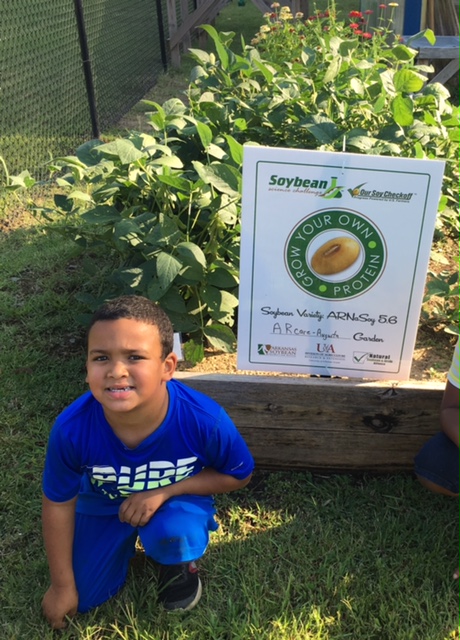Oct. 10, 2017
Grow Your Own Protein program begins harvest of soybeans, learning
By Sarah Cato
for the U of A System Division of Agriculture
Fast Facts
- Twenty-five gardens participating in Grow Your Own Protein harvesting their soybeans
- Goal was to teach communities about their local agriculture
- Harvested soybeans are being used to benefit communities
(850 words)
(newsrooms: with art at https://www.flickr.com/photos/uacescomm/36945021053 and https://www.flickr.com/photos/uacescomm/36904996774 )
Download Word version
LITTLE ROCK – Harvest season has started for school and community gardens participating in Grow Your Own Protein, a project that aims to teach about agriculture in Arkansas.
Grow Your Own Protein is a program that supplied local gardens with seed to grow ARNaSoy 5.6, a variety of soybean produced in Arkansas by the Natural Soybean and Grain Alliance. This is the first year for the program and included 25 gardens in 14 counties in Arkansas and even one in Texas.

Karen Ballard, professor of Program Evaluation with the University of Arkansas System Division of Agriculture, said the purpose of the program was to educate the community on the agriculture happening in their own backyards; to bridge the gap between local agriculture and the community.
Desha County Extension Agent Hope Bragg, who worked with the McGehee Outdoor Classroom in the McGehee public school district said the program was very successful in that aspect.
“Many of our youth did not realize soybeans even grew in Arkansas,” Bragg said. “The biggest success of this program at this point is simply having our youth being able to recognize the crop and knowing that they can eat soybeans.”
Many county agents were very eager to see the progress in their gardens. Michelle Mobley, Cleburne County extension staff chair for the Division of Agriculture, said she was excited about the results they’ve seen.
“I was really worried we wouldn’t have anything to harvest,” she said, “But they are loaded.”
Leigh Ann Bullington, Woodruff County extension staff chair for the division, worked with the ARcare Education Center Garden in Augusta. She said the students were very involved, and loved the experience.
“They have eagerly watched the plants grow and the pods fill,” she said. “They are anxiously waiting for the harvest so we can have steamed edamame for a sample tasting opportunity.”
Katie Hutton is with the Hope Gardens in Crittenden County. She is with both the Marion and West Memphis location. Katie said Grow Your Own Protein taught the participants about edamame and what it actually is.
“It was interesting to learn that although some of our adult volunteers ate edamame on a regular basis, they had no idea it was actually immature soybeans,” she said. “They were very surprised and excited to learn that they could actually harvest edamame in their own backyards.”
The Hope Garden used the Grow Your Own Protein project to involve some of special needs students in the community.
“Our soybean plot was planted as part of a day camp project for special needs students who come to A Bit of Hope, Inc. with their physical, occupational and speech therapy groups during the summer,” she said. “They had a wonderful time planting the seeds in the pre-tilled soil, but their favorite part was watering the seeds after planting. They enjoyed watching the beans grow and were able to water them during their bi-monthly day camps at the farm.”
Each garden is using their harvested soybeans in different ways to benefit their communities.
Hutton said the Hope Garden donates its vegetables to those in need in the community.
Mobley plans to use the soybeans for taste tests for the kids of Cleburne County to learn about soybeans. She will also use the harvested edamame as an appetizer for an appreciation luncheon for the county’s local figures.
Bragg plans to use the harvested soybeans as an opportunity to let the Desha County 4-H youth lead lessons in a food demonstration for students in their schools.
Ballard said that although funding is decided on an annual basis, plans are to continue the program for next year.
This project was made possible through the support of multiple partners including the Arkansas Soybean Promotion Board, the Arkansas Natural Soybean and Grain Alliance and extension specialists and agents across the state.
For more information about Grow Your Own Protein, contact Ballard at 501-671-2218 or kballard@uada.edu.
About the Division of Agriculture
The University of Arkansas System Division of Agriculture’s mission is to strengthen agriculture, communities, and families by connecting trusted research to the adoption of best practices. Through the Agricultural Experiment Station and the Cooperative Extension Service, the Division of Agriculture conducts research and extension work within the nation’s historic land grant education system.
The Division of Agriculture is one of 20 entities within the University of Arkansas System. It has offices in all 75 counties in Arkansas and faculty on five system campuses.
Pursuant to 7 CFR § 15.3, the University of Arkansas System Division of Agriculture offers all its Extension and Research programs and services (including employment) without regard to race, color, sex, national origin, religion, age, disability, marital or veteran status, genetic information, sexual preference, pregnancy or any other legally protected status, and is an equal opportunity institution.
# # #
Media Contact: Mary Hightower
Dir. of Communication Services
U of A System Division of Agriculture
Cooperative Extension Service
(501) 671-2126
mhightower@uada.edu
Related Links